They are from different schools of thought and from diverse backgrounds. Yet, as they prepare to make the dash to Bengaluru on Wednesday for the swearing-in ceremony of H.D. Kumaraswamy as the chief minister of Karnataka, leaders of different non-BJP political parties are bound by one common purpose: defeat the saffron party in 2019.
With minor variations in tone and tenor, the non-NDA parties have hailed the coming together of the Congress and the JD(S) to keep the BJP out of power in Karnataka, and 'opposition unity' has become a talking point. However, for now, it is in the context of uniting to defeat Prime Minister Narendra Modi and the BJP. That adhesive does not seem strong enough to bind these parties such that other fissures will be sealed.
Senior Congress leader Anand Sharma pointed out, “Congress president Rahul Gandhi has said repeatedly; and if you read the political resolution at the Congress' Plenary Session, it very clearly states that the policy approach we will have for 2019 elections will be state-specific, region-specific adjustments.”
There are states where the Congress is in a direct fight with the BJP, and there it is “pointless” for the party to have any alliance. “There are states where we feel some other party is strong. We will talk to them,” the former minister explained.
However, there can never be a pre-poll alliance or adjustments in states where there are regional parties that get along with the Congress, but cannot get along with each other. “That will be left to the post-election discussions. We have to keep that space open.”
It is in such cases that the Congress leadership feels the decision with whom to unite for government formation will have to be taken after the election results. But the recent experience in the Uttar Pradesh byelections for Phulpur and Gorakhpur Lok Sabha constituencies—where bitter rivals Samajwadi Party and Bahujan Samaj Party came together—remains in the thoughts and “kindles hopes.” The “Mahagathbandhan” model that routed the BJP in Bihar in 2015 also continues to boost the morale and increases the confidence of the opposition parties that they will be able to take on BJP president Amit Shah and Prime Minister Modi, if they stay with the thought of unity.
“But the opposition is determined that under the leadership of UPA chairperson Sonia Gandhi, we will get together. And as the largest party in the opposition, Congress will spare no effort in bringing about that necessary and desired unity to ensure the BJP is defeated,” said Sharma.
Randeep Surjewala, who heads the communication department of the Congress, says,“There is no one-size-fits-all, and the alliance will vary from state to state. The Karnataka development has demonstrated when need arises, Congress president Rahul Gandhi can walk across the aisle and tie up alliances as he did now between the Congress and the JD(S) and between the Congress, RJD and the JD(U)—the Mahagathbandhan—in Bihar.”
BSP supremo Mayawati, while hailing the edging out of the BJP in Karnataka by the Congress, played the “Behenji” to Rahul. She cautioned the Congress against using language that may offend anyone in the course of campaigning. “Congress should not repeat the mistake it committed while campaigning in Muslim-dominated areas, terming the JD(S) as the 'b team' of the BJP,” she said. This indicates the opposition parties are willing to exchange views and suggestions in order to swim together and maximise votes and seats to keep the BJP at bay. More so, given times are such that the alliance can as much be post-poll as pre-poll in nature.
Sitaram Yechury, the general secretary of the CPI(M), said his party's idea of unity ahead of elections revolved around “Oust Modi and save India, oust Mamata and save Bengal.” According to him, while seat adjustments can happen ahead of elections, “a ruling front is always formed after the election results. That is what has happened in the past, and that is the way it will happen. The current talks of opposition unity are fanciful flights, a mirage.” The CPI(M) will count itself out of any truck with the Trinamool Congress, the BJP and the allies of BJP.
Uddhav Thackeray, president of the Shiv Sena, an NDA ally that is seen as giving grief to the BJP, has said his party will not continue the relationship with the BJP. More than once, the Maharashtrian party has said they will fight the elections on their own, and Congress leader and former chief minister Prithviraj Chavan has even mentioned the possibility of the sena joining a Congress-led coalition.
The Congress feels it can fight on its own in MP, Rajasthan, Chhattisgarh and Mizoram. As a party with a pan-Indian presence, it expects to take a lead in beginning talks. "When leaders meet in Bengaluru, only intentions will be exchanged. Formal talks will happen in due course," said Sharma.
The Congress is buoyed by the Karnataka election results, which as it interprets, as having shown, in the words of Surjewala that "Prime Minister Modi's aura is fading with the speed at which it accelerated on account of his lies and rhetoric and performance.” It is even more enthused by the belief that the Congress beat "the entire incumbency and contained the BJP, which Modi and Shah projected as 'uncontainable' and unstoppable"
The BJP's showing in Lok Sabha 2014, when it emerged as the single largest party with a majority of its own after 30 years of coalition governments, apparently was not a signal that the era of coalition politics is over in India. Sharma says, “The diversity of India has to be reflected. That is a political reality we have to accept”


